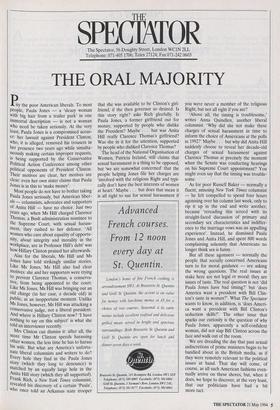THE SPECIATOR
The Spectator, 56 Doughty Street, London WC1N 2LL Telephone: 071-405 1706; Telex 27124; Fax 071-242 0603
THE ORAL MAJORITY
Most people do not have to bother taking Paula Jones seriously, but American liber- als — columnists, advocates and supporters of Anita Hill — have no choice. Just two Years ago, when Ms Hill charged Clarence Thomas, a Bush administration nominee to the Supreme Court, with sexual harass- ment, they rushed to her defence. 'All Women who care about equality of opportu- nity, about integrity and morality in the Workplace, are in Professor Hill's debt' was how Hillary Clinton praised her afterwards.
Alas for the liberals, Ms Hill and Ms Jones have told strikingly similar stories. Like Ms Jones, Ms Hill also had clear motives: she and her supporters were trying t9 prevent Clarence Thomas, a conserva- tive, from being appointed to the court. Like Ms Jones, Ms Hill was bringing out an old charge (in her case, a decade old) in Public, at an inopportune moment. Unlike Ms Jones, however, Ms Hill was attacking a Conservative judge, not a liberal president. And where is Hillary Clinton now? 'I have nothing to say on this subject' is what she told an interviewer recently.
Mrs Clinton can dismiss it: after all, the more time Mr Clinton spends harassing Other women, the less time he has to harass his wife. But what are America's unfortu- nate liberal columnists and writers to do? Every hole they find in the Paula Jones Story (which they long to denounce) is matched by an equally large hole in the Anita Hill story (which they all supported). Frank Rich, a New York Times columnist, revealed his discovery of a certain 'Paula', Who once told an Arkansas state trooper that she was available to be Clinton's girl- friend, if the then governor so desired. Is this story right? asks Rich gleefully. Is Paula Jones, a former girlfriend out for money, supported by people who dislike the President? Maybe . . . but was Anita Hill really Clarence Thomas's girlfriend? Was she in it for the attention, supported by people who disliked Clarence Thomas? The head of the National Organisation of Women, Patricia Ireland, still claims that sexual harassment is a thing to be opposed, but 'we are somewhat concerned' that the people helping Jones file her charges are 'involved with the religious Right and typi- cally don't have the best interests of women at heart.' Maybe . . but does that mean it is all right to sue for sexual harassment if you were never a member of the religious Right, but not all right if you are?
'Above all, the timing is troublesome,' writes Anna Quindlen, another liberal columnist. 'Why did she not make these charges of sexual harassment in time to inform the choice of Americans at the polls in 1992?' Maybe. . . but why did Anita Hill suddenly choose to reveal her decade-old charges of sexual harassment against Clarence Thomas at precisely the moment when the Senate was conducting hearings on his Supreme Court appointment? You might even say that the timing was trouble- some.
As for poor Russell Baker — normally a fluent, amusing New York Times columnist — he felt compelled to spend four hours agonising over his column last week, only to rip it up in the end and write another, because 'rereading this screed with its straight-faced discussion of primary and secondary sex characteristics and indiffer- ence to the marriage vows was an appalling experience'. Instead, he dismissed Paula Jones and Anita Hill, and spent 800 words complaining solemnly that Americans no longer think sex is funny.
But all these agonisers — normally the people that socially concerned Americans turn to for moral guidance — are asking the wrong questions. The real issues at stake here are not legal or moral: they are issues of taste. The real question is not 'did Paula Jones have bad timing?' but 'does America want a president with Bill Clin- ton's taste in women?'. What The Spectator wants to know, in addition, is `does Ameri- ca want a president with Bill Clinton's seduction skills?'. The other issue that sparks our curiosity is the question of why Paula Jones, apparently a self-confident woman, did not slap Bill Clinton across the face and walk out of the room.
We are dreading the day that past sexual indiscretions of prime ministers begin to be bandied about in the British media, as if they were remotely relevant to the political issues at hand. That day will come, of course, as all such American fashions even- tually arrive on these shores, but, when it does, we hope to discover, at the very least, that our politicians have had a bit more tact.




































































 Previous page
Previous page